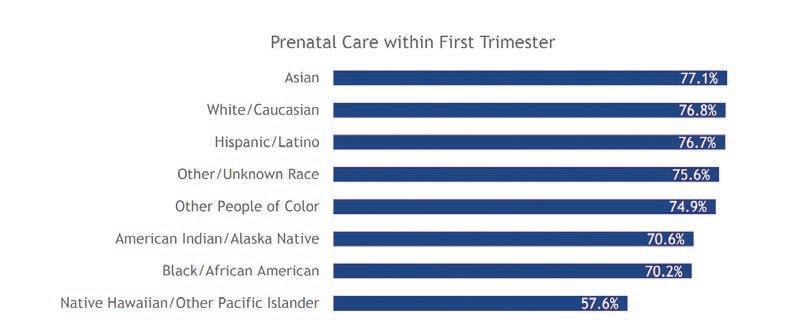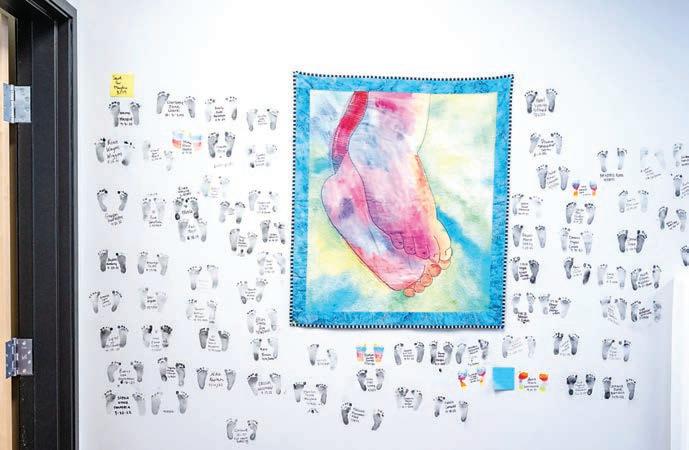
4 minute read
Colorado’s maternal death rate is rising
Study raises concerns
BY JENNIFER BROWN THE COLORADO SUN

About a quarter of Colorado pregnant women on Medicaid insurance do not go to a doctor’s appointment during the rst trimester, a statistic that likely contributes to the state’s rising maternal death rate.
at’s according to the latest “maternal health equity report” from the Colorado Department of Health Care Policy and Financing, which matched health records with 2020 birth certi cates across the state. e Medicaid program, called Health First Colorado, covers 40% of all births in the state, or nearly 26,000 births in 2020.
e maternal death rate examines the time period of a pregnancy through one year following the birth.
A previous report from Colorado’s Maternal Mortality Committee found the leading cause of maternal death was suicide, followed by accidental overdose.
A recently released national report from the Centers for Disease Control and Prevention found that the maternal death rate increased by nearly 40% from 2020 to 2021 and was 2.6 times higher for Black women compared with white women. e increase was attributed in part to the e ects of the COVID pandemic, including isolation.
“We are equivalent to a ird
World nation in terms of our maternal health,” said Lily Griego, regional director for the U.S. Department of Health and Human Services, who spoke Wednesday to Colorado Medicaid o cials and nonpro t advocates who want more equitable maternal health care. “Most folks are in shock about this.” e number of Colorado babies born chemically dependent on opioids and other drugs rose by 31% in one year, keeping with a national trend that has seen the rate of “neonatal abstinence syndrome” climb in the past decade. About 3.8% of newborns in 2020 whose mothers were on the government insurance program for Coloradans with low income were born with chemical dependency. at was up from 2.9% in 2019.
Colorado’s report from the state Medicaid division had other grim news, too.
Nationally, the number of addicted newborns jumped 82% from 2010 to 2017.
Colorado is working with the federal Medicaid department on a ve-year, $4.6 million program to provide better services for pregnant women who are addicted to opioids. e program sites are Denver Health, River Valley Family Health Centers in Montrose and Southern Colorado Harm Reduction Association in Pueblo.
Also, only 8.2% of pregnant people received a prenatal screening for depression, according to 2020 Med- icaid data. at’s an undercount, however, because many patients likely received a screening for depression but it was not captured in the system because doctors’ o ces often don’t bill for that as a separate service, Medicaid o cials said. e number of Medicaid patients who received screening for substance abuse or addiction treatment was also low. Statewide, just 49 pregnant people had such a screen, but Medicaid o cials believe that’s also an undercount since doctors don’t often submit claims for a separate, 15-minute substance abuse screening.

An analysis of claims data found that out of 4,405 births, about 17% of patients received at least one behavioral health visit.
Colorado now allows all pregnant people to continue their Medicaid coverage for 12 months after giving birth, regardless of whether they meet the income eligibility requirements. Medicaid o cials said the new policy is key to lowering the maternal death rate, including by making sure new parents have access to mental health treatment.
Prior to the change, people maintained coverage for just 60 days after giving birth.
Additional reforms include Medicaid coverage for doulas beginning next year. State o cials also are considering eliminating coverage restrictions at birthing centers, which are operated by midwives. More women are seeking to give birth in a birthing center instead of a hospital, an alternative that grew more popular during the coronavirus pandemic. e number of people who chose to give birth in a birth center rose almost 19% from 2019 to 2020. is story is from e Colorado Sun, a journalist-owned news outlet based in Denver and covering the state. For more, and to support e Colorado Sun, visit coloradosun. com. e Colorado Sun is a partner in the Colorado News Conservancy, owner of Colorado Community Media.
Prenatal care visits remained stable from 2019 to 2020, with 76% of pregnant women receiving care in the rst three months of pregnancy. Black patients were less likely to receive care, at 70%. And Native Hawaiian and other Paci c Islander people were the least likely to see a doctor in the rst trimester, at 58%.

Previous research has found that Native American women in Colorado are almost ve times more likely than other women to die in pregnancy or in the year following a birth.


Pia Long, with the reproductive justice organization Elephant Circle, said that eliminating racial inequity in maternal health care will require a system in which people can choose how and where to give birth.
“ at’s what equity looks like, is birth choice and reproductive choice,” she said.
Colorado’s Maternal Mortality Review Committee has not yet released data from 2020, but health o cials suspect that the maternal death rate worsened during the early days of the COVID pandemic the same way it did nationwide. e increase was due to COVID infection, as well as delays in seeking health care, and mental health and substance abuse issues brought on by social isolation.
Must enroll in autopay & paperless bill within 30 days of TV activation to receive bill credit starting in 1-3 bill cycles (pay $10 more/mo. until discount begins). Must maintain autopay/paperless bill and valid email address to continue credits. DIRECTV SVC TERMS: Subject to Equipment Lease & Customer Agreements. All o ers, packages, programming, promotions, features, terms, restrictions and conditions and all prices and fees not included in price guarantee are subject to change without notice.










